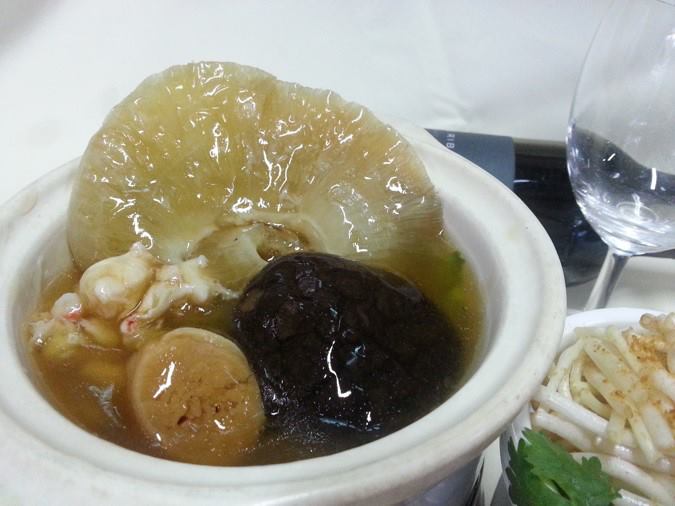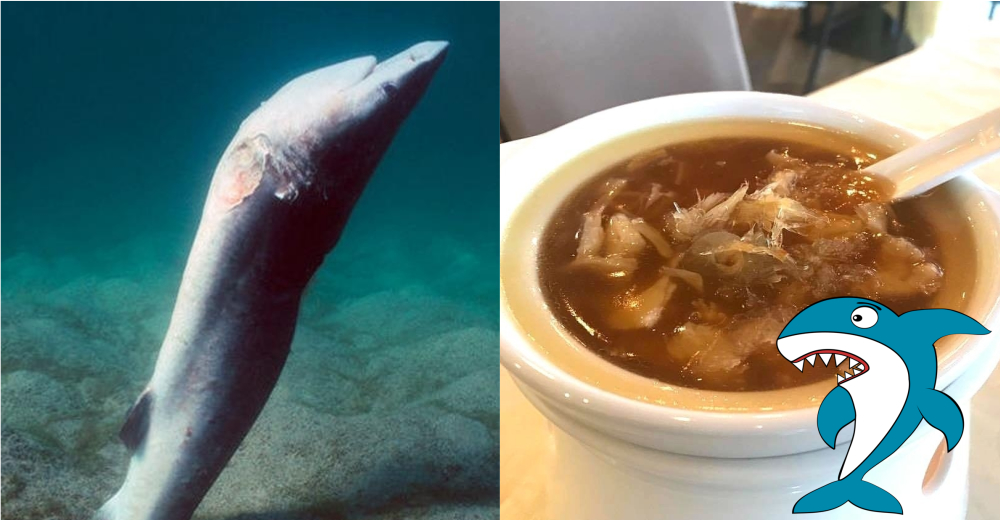DISCLAIMER: All op-eds published on Mothership, including this one, represent solely the opinion of their authors, and not the stance of the website or company or group of people it represents.
*GRAPHIC WARNING: there's a graphic gif a few lines down from here that may be too disturbing for some readers. Proceed with caution.*
Shark's fin soup is a controversial menu item because, according to the World Wildlife Fund (WWF), 25 per cent of shark species face extinction globally.
 Image from Alicia Tan's Facebook post.
Image from Alicia Tan's Facebook post.
And given the increasing awareness on environmental sustainability in recent years, even celebrities such as Jay Chou have also spoken out against the consumption of shark fin.
I wouldn't buy shark's fin soup
Now, just so we're clear, I share and feel strongly the very valid concerns that the consumption of shark's fin is threatening their species, and I would not buy shark's fin.
It isn't difficult for me to do this, either — I do find Shark's Fin soup tasty, but I can also easily live without it.
Especially after seeing things like this:
[caption id="" align="alignnone" width="510"] Gif via The Humane Society of United States.[/caption]
Gif via The Humane Society of United States.[/caption]
Visceral videos aside, though, I have in my four years studying environmental sciences learned about the importance of sharks as apex predators, and that their extinction would have disastrous consequences for the ecosystem.
So my stance on this is clear and straightforward to take: if I had the choice between shark's fin and something else, my choice would be something else (provided it isn't something more endangered than sharks) — whether I was the bride at my own wedding dinner, or running a corporate event, as long as the decision rests with me, I would avoid shark's fin.
Majority of Singaporeans feel the same, thankfully
Fortunately, statistics seem to show that it's becoming less common for Singaporeans to eat shark's fin.
A 2016 study by WWF Singapore found that 82 per cent of Singaporeans surveyed had not consumed shark's fin for at least a year.
Hopefully that number has gone up in the years that followed.
Another thing that's certainly been helpful in this regard is the initiative of large hotel chains to remove shark's fin from their menus — instead, they now offer alternatives made with fish maw or vermicelli:
- Andaz Singapore
- Capella Singapore
- Conrad Singapore
- Crowne Plaza Changi Airport
- Crystal Jade Culinary Holdings
- Fairmont Singapore
- foodpanda
- Grand Hyatt Singapore
- Hilton Singapore
- Hotel Jen Tanglin Singapore
- Hyatt Hotels
- Le Méridien Singapore, Sentosa
- Marina Bay Sands
- Ramada and Days at Zhongshan Park
- Regent Singapore, A Four Seasons Hotel
- Ritz-Carlton
- Shangri-La Singapore
- Shangri-La's Rasa Sentosa Resort
- Siloso Beach Resort
- Swissotel The Stamford
- The Fullerton Hotel
- The Westin Singapore
- W Hotel
- Xi Yan Private Dining
I join conservationists in naming and praising them for their efforts because this is a brave step, considering it could cost them the business of traditional customers who may continue to see the service of shark's fin soup at dinners as a status symbol.
But all that being said, though, in the event I am at a place where shark's fin soup happens to be part of the dinner menu, particularly during occasions like wedding or reunion dinners, I would find it difficult to say "no" to any bowl of shark fin soup served to me.
Let me explain.
1) Refusing shark's fin at dinner is rude & doesn't help anyone (not even the shark)
 Photo via Punggol Seafood Hock Kee Facebook page
Photo via Punggol Seafood Hock Kee Facebook page
At dinners like the ones I mentioned above (which are always joyous occasions, of course), hosts and guests come together with the intention of sharing well-wishes with each other.
And of course, at these events, the hosts go above and beyond in their efforts (or at least the money they spend), to provide generously for their guests.
It's also a common custom, courtesy and tradition to appreciate the food set before you by eating what you've been given, so kicking up a fuss about it being served is not a good idea.
Well, why not just leave it untouched, you might ask? It is often argued that doing this is enough to make a statement, without needing to say anything.
I have many environmentally-conscious friends who do that on principle. And certainly, I, in my turn, previously felt I should do the same.
And I did, once.
But what I realised was that even if everyone at the table refused to drink the soup, the dinner was already paid for and the shark's fin was already harvested, cut, dried and cooked.
In other words, a shark had already died for this dinner.
There was no way for me to ascertain if the hotel or the hosts of the dinner would be aware of the number of portions of soup being discarded, and thereby receive it as feedback to stop providing shark's fin soup in future. Perhaps only the dinner servers clearing it may know, and how likely are they to bother to tell their banquet managers, and in turn, the people who decide what goes on a hotel's or restaurant's banquet menu?
All this in turn led me to wonder: What good would it do to refuse my share now? How does letting a share of perfectly good food go to waste put a dampener on demand?
That's right — none, and it doesn't.
2) Even worse: trying to start a lecture to educate everyone about the evils of the shark's fin trade
Let's take this a step further and imagine, under these already-tricky circumstances, how rude it would be if at the aforementioned dinner setting, I started a lecture, to anyone who would listen, about the evils of supporting the shark's fin industry?
Not only would I completely spoil the celebratory mood of the event, it would also without a doubt be a slap in the faces of my hosts, who obviously made the decision to serve shark's fin.
Speaking out against exploiters and merciless profit-seeking shark traders would also more likely than not be off-putting for people who didn't ask to be a captive audience to my message. If I may put this into a logical sequence:
I'm more inclined, instead, to treat my hosts with courtesy and respect by accepting the food they have prepared — even if this means that I end up eating the bowl of shark's fin soup.
3) Shark conservation is a tough sell, especially among the older generation
I am well aware that many from the older generation, including people like my parents and relatives, are not exactly bothered with arguably abstract-sounding topics like environmental sustainability.
And they've got many reasons to continue ordering, cooking and preparing shark's fin in their soups. Here are just five:
- They view sharks as a food source, in no different a manner from the poultry they reared growing up in the kampong.
- They aren't familiar with how shark fins are farmed, or don't understand that the shark fin trade is detrimental to their species and the environment as a whole.
- Or if they are educated in this regard, they share different points of view regarding what is ethical consumption.
- They still see shark's fin soup (and crucially, the ability to serve it) as a symbol of status and luxury.
- They simply don't feel that dried scallop or fish maw are good-enough alternatives.
I believe that this difference in mindsets can be attributed to how one is brought up and educated.
Hence, given how they view sharks, they may take longer to accept that view that sharks should be conserved.
So here's what I would do instead: introduce it gently
If we want to curb the demand for shark fin, I think it is less helpful to refuse to eat shark's fin than it is to facilitate conversations that can result in a change in cultural mindsets.
However, refusing my share — and disrupting the mood of the happy occasion — would be counterproductive in the goal of changing the older generation's perspectives.
The act of refusing my share would more likely instead make them more reluctant to share their views or hear me out.
As hypocritical as this may sound, I find that it is easier to strike up a conversation on why it is bad to eat shark's fin while having my share of shark's fin soup.
Here's how the conversation can go:
First, I acknowledge that this bowl of shark fin soup is delicious (kind of like the Marie Kondo method — thank your shark's fin soup first).
Once I strike a rapport with my dining companions in discussing it, I highlight the possible health detriments to eating shark's fin as a way to get them to reconsider their shark's fin consumption habits:
Being at the top of the food chain, a shark consumes other smaller fish. In this process, the toxins found in these smaller fish accumulate, and, yes, they are passed on to human beings when we eat shark's fin.
Subsequently, I bring up the fact that sharks are endangered species, and perhaps at the risk of a few remaining politeness points on the part of the person still listening to me, even slip in something about why conservation is important.
I believe the key to a meaningful discussion is in being careful not to come across as patronising or imposing, and this is how I'd do it — even it is while tucking in to shark's fin soup.
Being respectful as I work toward an increasing respect for the environment
Sure, you're free to focus on the fact that I am still guilty of consuming shark fin soup.
And I make no bones about the fact that indeed, I would, as I mentioned, choose every time to be respectful at the expense of making a statement or protesting the questionable demand for an otherwise-quite-tasteless part of an under-threat-of-extinction species.
It is crucial to me, to initiate a meaningful conversation about environmental conservation without coming across as rude to my elders at dinner.
By keeping an open mind to other worldviews, I feel I am able to have more comfortable exchanges with people about shark fin consumption.
Of course, a change in mindset will not happen overnight, and will definitely require various methods of advocacy to spark changes in consumption patterns.
My approach is merely one of the small steps that I, as an individual, can take to raise awareness, especially amongst a target group that cares very little for environmental conservation.
Top photo collage from Eric Ian Chan's Facebook and Dapur Mama Fyzra
https://mothership.sg/2016/09/jay-chou-speaks-english-to-deter-everyone-from-buying-eating-shark-fin/?fbclid=IwAR2OK1r_tPdd5qbbLSCf8MkrgqBDWOROaLdNsAPDNuOPs8D6C_zGGoyRPyA
If you like what you read, follow us on Facebook, Instagram, Twitter and Telegram to get the latest updates.
